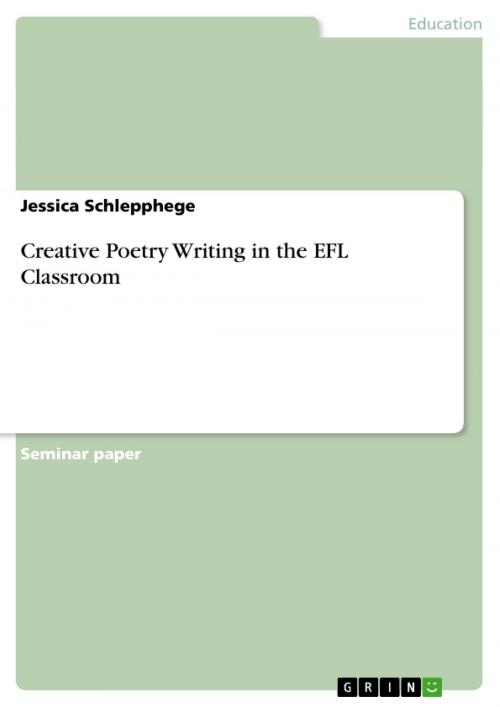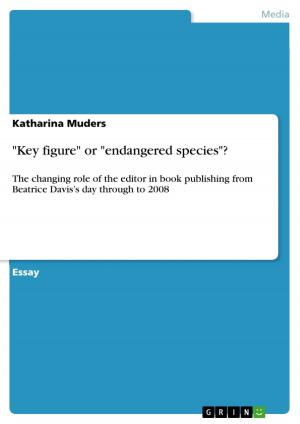Creative Poetry Writing in the EFL Classroom
Nonfiction, Reference & Language, Study Aids, ESL, Foreign Languages| Author: | Jessica Schlepphege | ISBN: | 9783640503933 |
| Publisher: | GRIN Publishing | Publication: | January 6, 2010 |
| Imprint: | GRIN Publishing | Language: | English |
| Author: | Jessica Schlepphege |
| ISBN: | 9783640503933 |
| Publisher: | GRIN Publishing |
| Publication: | January 6, 2010 |
| Imprint: | GRIN Publishing |
| Language: | English |
Seminar paper from the year 2009 in the subject English - Pedagogy, Didactics, Literature Studies, grade: 1,0, University of Education Heidelberg, language: English, abstract: 'There is a poetic potential in all of us, it only needs to be wakened.' Altvater 1998, 259 Would the teachers of great poets like Barret Browning, Dickinson, Shakespeare or Whitman have known what great writers were sitting in front of them? How many geniuses might be sitting in today's classrooms? If English teachers want to get a glimpse of what poetic potential their pupils might have, they should bring poetry into the classrooms and inspire their pupils to become poetic writers themselves. This paper aims at giving an overview of creative poetry writing and giving reasons why and how teachers should bring it into their classrooms. Starting with a definition of the term 'creative writing', I will begin by discussing the benefits of implementing creative writing methods followed by the benefits of introducing literature and poetry into the classroom. Those two chapters in total give the answer to the question why teachers should bring creative poetry writing into their classrooms. After giving insight into the language skills that are being supported and discussing the possible challenges a teacher might face, the question of 'how' to implement creative poetry writing into the EFL classroom is presented. The paper is completed by a brief discourse about feedback and assessment and tied together by the conclusion.
Seminar paper from the year 2009 in the subject English - Pedagogy, Didactics, Literature Studies, grade: 1,0, University of Education Heidelberg, language: English, abstract: 'There is a poetic potential in all of us, it only needs to be wakened.' Altvater 1998, 259 Would the teachers of great poets like Barret Browning, Dickinson, Shakespeare or Whitman have known what great writers were sitting in front of them? How many geniuses might be sitting in today's classrooms? If English teachers want to get a glimpse of what poetic potential their pupils might have, they should bring poetry into the classrooms and inspire their pupils to become poetic writers themselves. This paper aims at giving an overview of creative poetry writing and giving reasons why and how teachers should bring it into their classrooms. Starting with a definition of the term 'creative writing', I will begin by discussing the benefits of implementing creative writing methods followed by the benefits of introducing literature and poetry into the classroom. Those two chapters in total give the answer to the question why teachers should bring creative poetry writing into their classrooms. After giving insight into the language skills that are being supported and discussing the possible challenges a teacher might face, the question of 'how' to implement creative poetry writing into the EFL classroom is presented. The paper is completed by a brief discourse about feedback and assessment and tied together by the conclusion.















